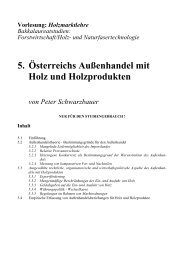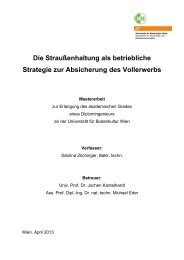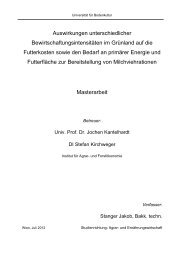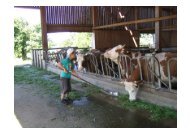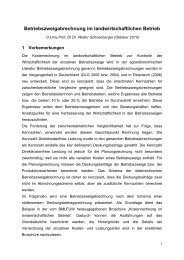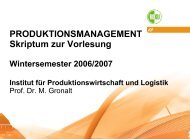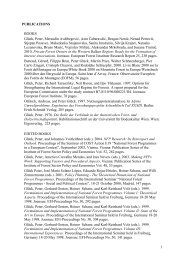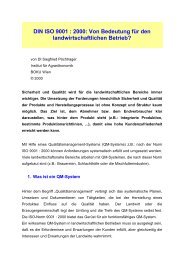Certification and Accreditation of Organics in Austria - Boku
Certification and Accreditation of Organics in Austria - Boku
Certification and Accreditation of Organics in Austria - Boku
Create successful ePaper yourself
Turn your PDF publications into a flip-book with our unique Google optimized e-Paper software.
18<br />
farms engaged <strong>in</strong> on-farm process<strong>in</strong>g <strong>and</strong> direct sell<strong>in</strong>g.<br />
However, this image is be<strong>in</strong>g overrun by reality:<br />
as the market for organic products grows, <strong>in</strong>dustries<br />
<strong>and</strong> supermarkets get <strong>in</strong>volved <strong>and</strong> the volume <strong>of</strong> organic<br />
products be<strong>in</strong>g transported, stored, <strong>and</strong> <strong>in</strong>dustrially<br />
processed <strong>and</strong> retailed grows considerably.<br />
Thus the <strong>in</strong>struments needed to ensure organic quality<br />
have changed; <strong>in</strong> particular, the need for a centralized<br />
database has been voiced (KdK, 2002). Such<br />
a database would comb<strong>in</strong>e the piecemeal <strong>in</strong>formation<br />
that is available at various authorities <strong>and</strong> agencies.<br />
The goal is to improve transparency <strong>and</strong> allow a<br />
comprehensive analysis <strong>of</strong> the flow <strong>of</strong> organic goods,<br />
which could then be traced along the complete food<br />
cha<strong>in</strong>, from farm <strong>in</strong>puts <strong>and</strong> production, through traders<br />
<strong>and</strong> storage, to process<strong>in</strong>g <strong>and</strong> retail. This would<br />
allow plausibility, product <strong>in</strong>tegrity <strong>and</strong> traceability<br />
to be checked more easily <strong>and</strong> would dramatically<br />
<strong>in</strong>crease the efficiency <strong>of</strong> <strong>in</strong>spections.<br />
To accommodate concerns about privacy <strong>of</strong> data, the<br />
access to the database could be restricted to a limited<br />
number <strong>of</strong> federal agents. A database alone cannot be<br />
sufficient to address the issue. It is <strong>in</strong>dispensable to<br />
have dedicated government employees whose objective<br />
is not only to analyze the data but also to <strong>in</strong>quire<br />
<strong>in</strong> cases <strong>of</strong> suspected irregularities as well as rout<strong>in</strong>e<br />
trac<strong>in</strong>g <strong>of</strong> product flows along the food cha<strong>in</strong>. Such<br />
an authority would address the weakest po<strong>in</strong>t <strong>of</strong> the<br />
current certification system, namely organic product<br />
flows across boundaries: between states, operators,<br />
certification bodies, etc.<br />
This authority should be at the federal level, as only a<br />
government entity has the necessary legal authority to<br />
enforce m<strong>in</strong>imum st<strong>and</strong>ards (Lohr, 1998) as well as<br />
the <strong>in</strong>dependence to ensure objectivity <strong>and</strong> uniformity.<br />
Also, volume flow controls are about basel<strong>in</strong>e<br />
requirements, thus there is no need to adjust to regional<br />
<strong>and</strong> local circumstances, which could be a<br />
challenge to a central authority.<br />
Despite some flaws <strong>in</strong> overall coord<strong>in</strong>ation, the current<br />
system <strong>of</strong> private certification bodies has proven<br />
robust. Indeed, as found <strong>in</strong> Sweden (Baummann,<br />
2001), a private certification body has advantages<br />
over a state one. First, <strong>in</strong> <strong>Austria</strong> most certification<br />
bodies were created by organic farmers’ associations<br />
or organizations rooted <strong>in</strong> the organic movement.<br />
They therefore tend to be committed to the values <strong>of</strong><br />
organic farm<strong>in</strong>g. This is a benefit compared to<br />
certification by public authorities, who tend to focus<br />
on adm<strong>in</strong>istrative matters rather than the correspon-<br />
dence <strong>of</strong> values <strong>and</strong> regulation, as reported from<br />
Denmark (Michelsen, 2001). Second, private<br />
certifiers <strong>in</strong> <strong>Austria</strong> also tend to have employees<br />
resid<strong>in</strong>g <strong>in</strong> their assigned region. This allows them a<br />
more accurate assessment <strong>of</strong> a specific situation, such<br />
as a drought that reduces seed availability. It also<br />
allows certifiers to deal with the need to develop<br />
different solutions to similar problems <strong>in</strong> different<br />
environments, which is an <strong>in</strong>tegral part <strong>of</strong> organic<br />
farm<strong>in</strong>g (Michelsen, 2001).<br />
Local roots also ensure certifiers a better level <strong>of</strong><br />
<strong>in</strong>formation through their <strong>in</strong>volvement <strong>in</strong> both formal<br />
<strong>and</strong> <strong>in</strong>formal communication networks. Thus operator<br />
peer-control can play a role <strong>in</strong> identify<strong>in</strong>g<br />
potential problems, <strong>and</strong> not limit control <strong>of</strong> an organic<br />
farm or processor to the yearly visit(s). As long as<br />
supervision ensures impartiality <strong>of</strong> the certifiers,<br />
these are valuable features <strong>of</strong> a certification system<br />
that aims at do<strong>in</strong>g justice to the needs <strong>of</strong> organic<br />
farm<strong>in</strong>g.<br />
For it must be acknowledged that organic farm<strong>in</strong>g<br />
cannot be reduced to checklists, s<strong>in</strong>ce it is also a<br />
social <strong>and</strong> ecological movement. St<strong>and</strong>ardized production<br />
method <strong>and</strong> regulations have difficulties<br />
cop<strong>in</strong>g with such a phenomenon (Rundgren, 1997).<br />
Thus there is a great need for clarity <strong>and</strong> simplification<br />
<strong>in</strong> our underst<strong>and</strong><strong>in</strong>g <strong>of</strong> what organic farm<strong>in</strong>g<br />
really st<strong>and</strong>s for, so that it to st<strong>and</strong>s out as a real production<br />
alternative <strong>and</strong> not simply as a production<br />
method that complies with a set <strong>of</strong> more or less<br />
transparent regulations (DARCOF, 2000).<br />
In the present situation, where consumers <strong>in</strong> <strong>in</strong>creas<strong>in</strong>g<br />
numbers are concerned about degradation <strong>of</strong><br />
st<strong>and</strong>ards, food quality, <strong>and</strong> so forth, it is easy to ask<br />
for strict rules, high st<strong>and</strong>ards, <strong>and</strong> efficient <strong>in</strong>spection<br />
<strong>in</strong> organic agriculture. But <strong>of</strong>ten what consumers<br />
expect is a higher moral st<strong>and</strong>ard: just as the organic<br />
farmer should not exploit the soil or the livestock, so,<br />
too, the consumers hope that they are not exploited<br />
when buy<strong>in</strong>g organically produced food (Kettlitz,<br />
2002). Indeed, even if organic growth is based on<br />
short-term concerns about health <strong>and</strong> food security, it<br />
also responds to long-term concerns about our society,<br />
a quest for old <strong>and</strong> new values, a search for the<br />
truth beh<strong>in</strong>d notions such as “natural” (Haest, 2000),<br />
<strong>and</strong> a need for authentic products (Kelterborn, 2000).<br />
Therefore if st<strong>and</strong>ards, regulations <strong>and</strong> certification<br />
procedures betray the core <strong>of</strong> what organic farm<strong>in</strong>g<br />
st<strong>and</strong>s for, it might well also betray the expectation <strong>of</strong><br />
consumers who are search<strong>in</strong>g for an alternative.



